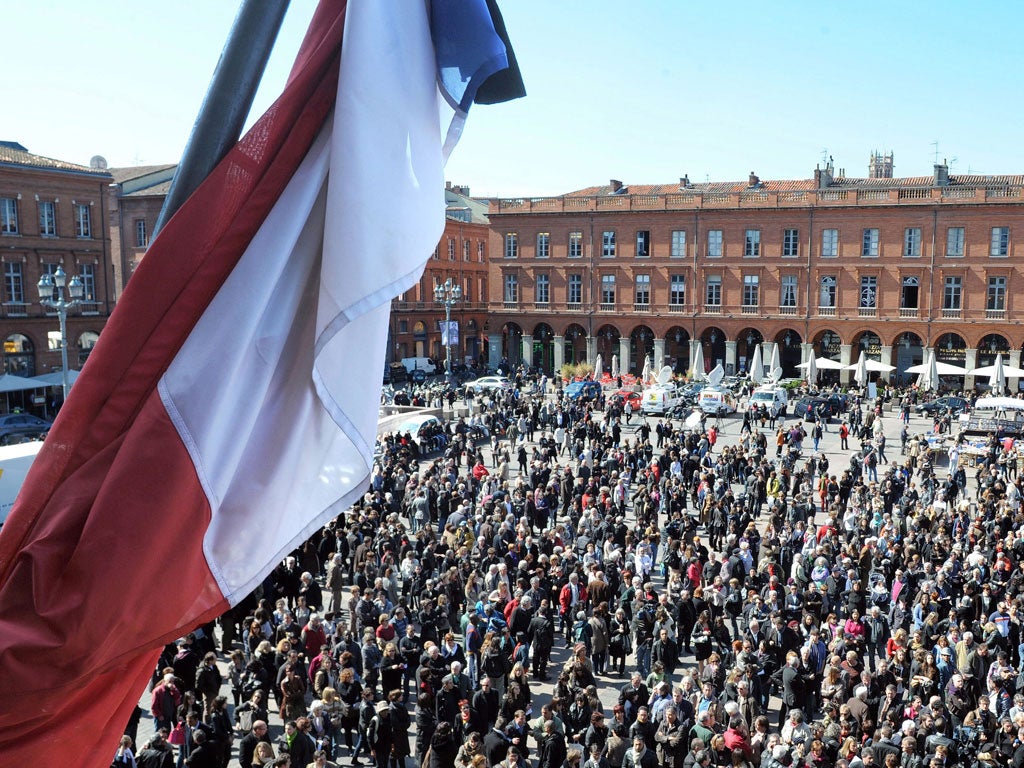Police accused of failures over Toulouse terror deaths
Islamist killer who died in shootout with officers could have been captured earlier, and taken alive, say critics

Your support helps us to tell the story
From reproductive rights to climate change to Big Tech, The Independent is on the ground when the story is developing. Whether it's investigating the financials of Elon Musk's pro-Trump PAC or producing our latest documentary, 'The A Word', which shines a light on the American women fighting for reproductive rights, we know how important it is to parse out the facts from the messaging.
At such a critical moment in US history, we need reporters on the ground. Your donation allows us to keep sending journalists to speak to both sides of the story.
The Independent is trusted by Americans across the entire political spectrum. And unlike many other quality news outlets, we choose not to lock Americans out of our reporting and analysis with paywalls. We believe quality journalism should be available to everyone, paid for by those who can afford it.
Your support makes all the difference.Mohamed Merah may be dead but the political crossfire over his 12-day reign of terror in south-west France rages on.
Awkward questions were raised yesterday by opposition politicians, a retired police chief and President Nicolas Sarkozy's Defence Minister over the failure of the security services and police to identify the gunman earlier and capture him alive.
Merah, 23, who murdered three children and four adults in eight days, claimed to have been commissioned by al-Qa'ida to "bring France to its knees". His killing spree and spectacular death after a 32-hour siege on Thursday have left politicians and different branches of the legal and security apparatus at one another's throats.
With four weeks to go until the first-round vote in the presidential election, the killings have become intensely, and unpleasantly, political. Mr Sarkozy has called for "national unity" and "dignity" but his re-election campaign is trying to extract maximum advantage from the affair. Senior figures in the President's UMP party have begun to attack François Hollande, the Socialist front-runner, as "soft" on terrorism. UMP leaders also accuse Mr Hollande of "indecency" in suggesting that Mr Sarkozy helped to create a climate of hatred which allowed the killings to happen. Earlier, when Merah was presumed to be a far-right fanatic, Mr Hollande urged politicians to "control their language" on immigration and race. Yesterday, he demanded an investigation into the "lapse" in surveillance which failed to track a known Islamist extremist like Merah.
The Prime Minister, François Fillon, backed the police. "Resolving a criminal case of this importance in 10 days, I believe that's practically unprecedented in the history of our country," he told RTL radio. There were, however, accusations from a left-leaning magistrates' union that the Interior Minister, and Sarkozy ally, Claude Guéant, played an inappropriate, or harmful role in assuming control of the investigation and siege. The Green Party's presidential candidate, Eva Joly, a former magistrate, suggested that Mr Guéant's high profile in the inquiry was "unconstitutional" and electorally motivated.
Christian Prouteau, the retired chief of the elite GIGN commando unit of the Gendarmerie Nationale, claimed that the national police force's special tactical operations unit, the RAID, had mishandled the affair. Mr Prouteau said Merah could have been taken alive if RAID commandos had used tear gas and not stun grenades. Local police in Toulouse also complained, off the record, about the RAID. They told local media they wanted to grab Merah on the street, but were overruled in favour of a night raid on his flat.
Perhaps most damagingly, the Defence Minister, Gérard Longuet, said that "a considerable amount of time" was wasted because the police believed a neo-Nazi ex-paratrooper was to blame. "There were people who absolutely wanted to look in the direction [of a neo-Nazi killer] and no other," he said.
Merah's first three victims, in two attacks on 11 March and 15 March, were paratroopers of North African origin. It was only after he killed three children and a teacher at a Jewish school on Monday that the investigation took a new approach, Mr Longuet said.
His comments followed claims that the inquiry into the attacks on the paratroopers was clumsy. Last Saturday, detectives were given a list of 500 people who had answered a sales advertisement placed by Merah's first soldier victim. The list included the computer address of Merah's mother. Moreover, the gunman lived one kilometre from the scene of the first killing in Toulouse – but no link was made with him until Monday evening, after he had attacked the Lycée Ozar Hatorah.
Merah's radical Islamist views were known to the internal security service but he was seen as a "wannabe" fanatic and not a real threat.
Teacher orders minute's silence for Merah
France's Education Minister, Luc Chatel, has demanded the suspension of a teacher who asked her 17- and 18-year-old pupils to observe a minute's silence for Mohamed Merah, the gunman killed after a 32-hour siege in Toulouse on Thursday.
Lorraine Collin, 56, an English teacher at the lyceé Gustave-Flaubert in Rouen in Normandy, told her pupils Merah was the "victim of an unhappy childhood" and that his alleged links with al-Qa'ida had been "invented" by President Sarkozy and the media.
Most of her pupils walked out of the class and complained to the school authorities. Ms Collin was later reported to have apologised and said she was not feeling well.
Mr Chatel said her behaviour was "unspeakable". He told the local education board she must be suspended and disciplined.
Join our commenting forum
Join thought-provoking conversations, follow other Independent readers and see their replies
0Comments